Forums, Dial-Up, and Satire: 1990s Internet in the Global South
A conference held at Annenberg explored “the long 1990s,” a period of media transformation sparked by something called the internet.
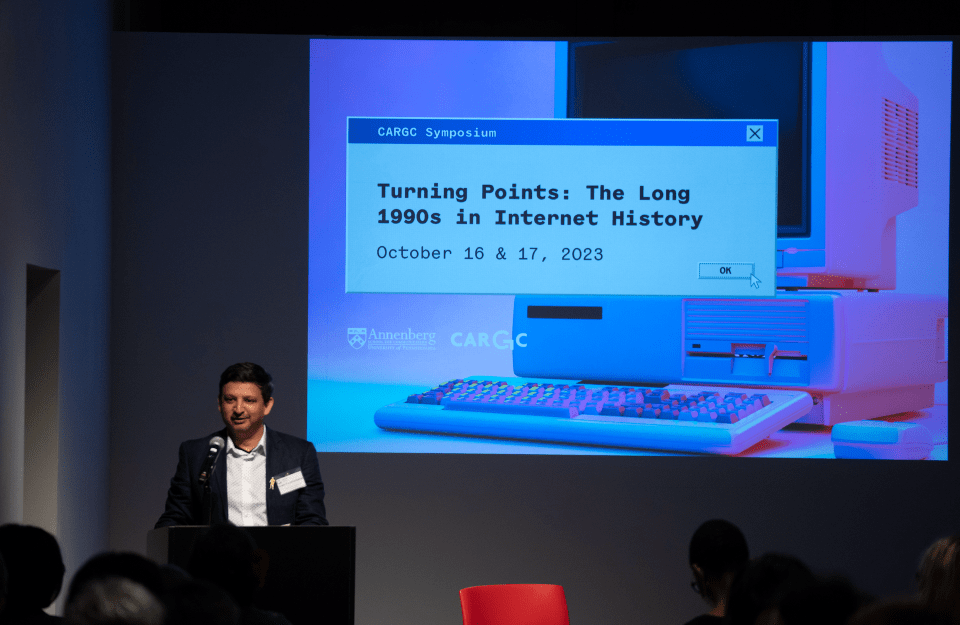
Professor Aswin Punathambekar addresses attendees at the recent CARGC symposium, “Turning Points: The Long 1990s in Internet History.”
January 1, 1983 is considered to be the official birthday of the internet, but pinning down the start of the “internet age” is something far more nebulous.
For one, it depends on location. In the U.S., it might be when every mailbox seemed to contain a CD from AOL promising 500 free hours online. In China, it might be when China Telecom began offering dial-up internet access charged directly to a user’s phone bill.
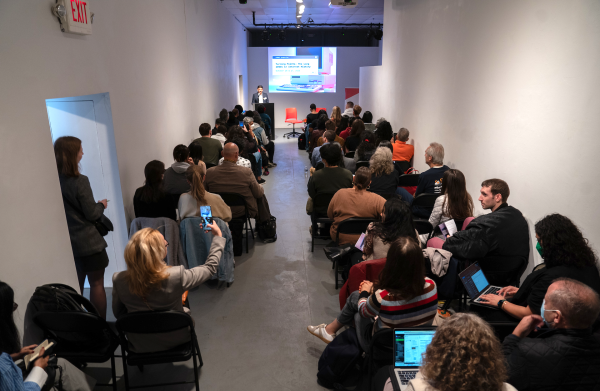
At a recent symposium organized by the Center for Advanced Research in Global Communication (CARGC) at the Annenberg School for Communication at the University of Pennsylvania, media scholars shared important pieces of internet history from around the globe, from establishing “telecottages” in Hungary to the lasting legacy of the Nokia 3310 cellphone.
The two-day symposium, a satellite event of the annual conference of the Association of Internet Researchers, was called “Turning Points: The Long 1990s in Internet History.”
“The symposium emerged after a group of us involved with CARGC came together to talk about rethinking the coordinates and foundations, north-Atlantic and Anglophone, for the most part, of Media and Communication studies,” says CARGC Director Aswin Punathambekar. “Given the significance of the 'long 1990s' to the formation of this field, we decided to revisit the period and explore what new histories of the internet emerge into view if we think from that moment.”
Four members of the Annenberg community gave talks at the conference: Guobin Yang, Grace Lee Boggs Professor of Communication and Sociology; Florence Madenga, George Gerbner Postdoctoral Fellow; Sandeep Mertia, joint Postdoctoral Fellow with CARGC and the Center on Digital Culture and Society; and Natalie Fenton, Visiting Scholar from Goldsmiths University.
Belatedly Global Internet Histories
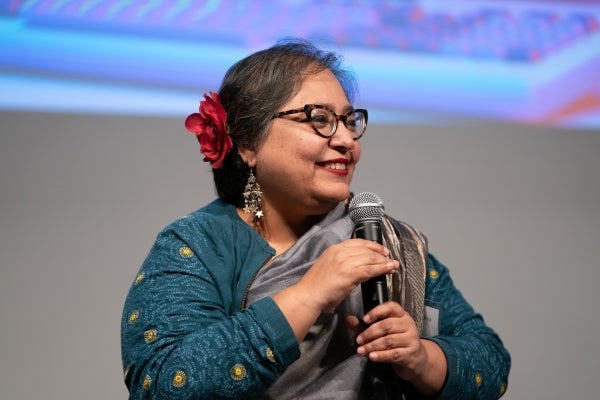
Punathambekar, Professor of Communication, opened the symposium with context around the key themes of “Turning Points: The Long 1990s in Internet History.”
He spoke about “belatedness” in regards to building a more robust historical account of internet histories, one that includes more than just men sitting at computers in the United States.
The symposium continued with a keynote by Paromita Vohra, a pioneer in Indian television, who discussed how satellite television and early Bollywood movies paved the way for the country’s internet, producing a taboo, sexually-charged visual and linguistic vernacular that would live on in chat rooms and social media.
BBS in China
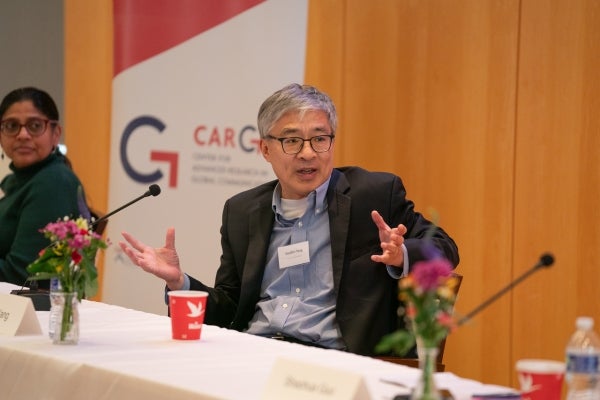
On day two of the symposium, Guobin Yang, Grace Lee Boggs Professor of Communication and Sociology at Annenberg, spoke about the culture of early 1990s Chinese bulletin board systems (BBS).
These systems, a precursor to modern online forums accessed via dial-up modem, were introduced to mainland China via universities in the mid-’90s. BBS forums gave young people an exciting place to gather after the political and cultural upheaval of the 1980s, said Yang, a place to be playful, make friends, and tell stories and jokes.
“BBS forums became the central infrastructures of community,” he said, “They contained expressions of personal interests and hobbies rather than grand narratives of the past.”
“Owning” a Dictator
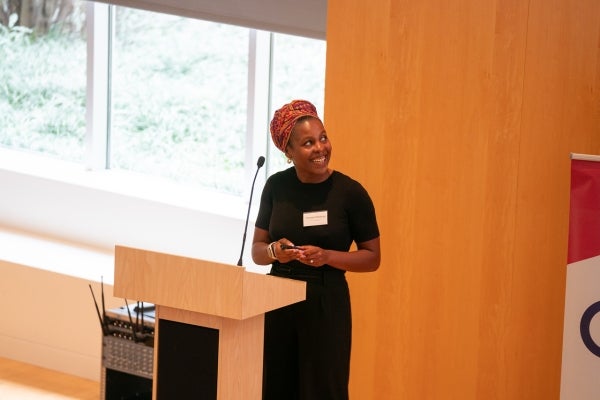
George Gerbner Postdoctoral Fellow Florence Madenga spoke of a different kind of gathering place — bob.co.za, a satirical website dedicated to mocking then-President Robert Mugabe — in her talk, “Dear Comrades: Surviving and Owning Robert Mugabe on the Internet.”
When Zimbabwe's first internet service provider launched in 1994, Mugabe’s regime was faced with new forms of criticism of the president, something it was already actively working to suppress. Bob.co.za came online on April 1, 2002, claiming to be Robert Mugabe’s personal website.
Madenga spoke of the power of this website and of digital humor itself: “Through dismembering the symbolic embodiment of power, in this case, the president, digital humor can be employed as a form of subversion, especially in the context of autocracy,” she said.
Software Parks and Outsourcing
Sandeep Mertia, joint Postdoctoral Fellow with CARGC and the Center on Digital Culture and Society, spoke about the development of India’s booming IT outsourcing industry and its transformation to the country’s modern startup culture.
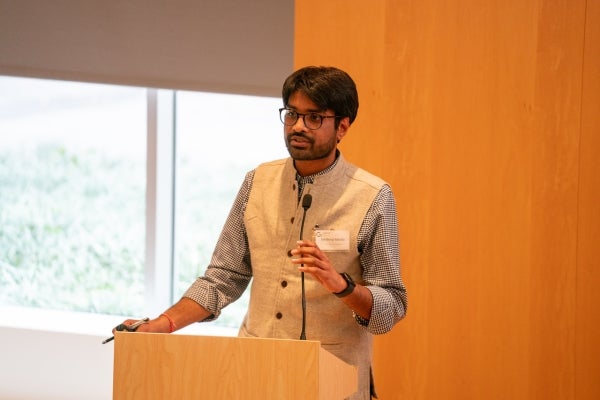
“During the economic crisis of 1991, the government of India set up Software Technology Parks of India (STPI), dedicated software export zones to promote the nascent IT outsourcing industry,” he said.
STPI took over old buildings and fitted them with the infrastructure needed for high-speed internet. New tech companies rented the buildings and gained access to international internet service providers.
Mertia is interested in STPI’s recent transformation into an agency for data centers and startup incubators. The buildings still stand, but now they have a different purpose.
“The same institution that was creating basic satellite needs is now creating data centers and visions of a data-driven value production,” he said.
Online Activist Communities
At the end of day two, Natalie Fenton, visiting scholar from Goldsmiths University, gave a presentation entitled, “Traces of hope or trails of hopelessness: the protest and politics of Indymedia and the anti-globalisation movement.”
She told the story of Indymedia, a network of websites for citizen journalists and activists, launched in the wake of the 1999 Carnival Against Capital and 1999 Seattle WTO protests during the late 1990s anti-globalization movement.
Local media centers around the globe belonged to the Indymedia network, creating a shared space for citizen activists to come together and share news and connect protests across the world.
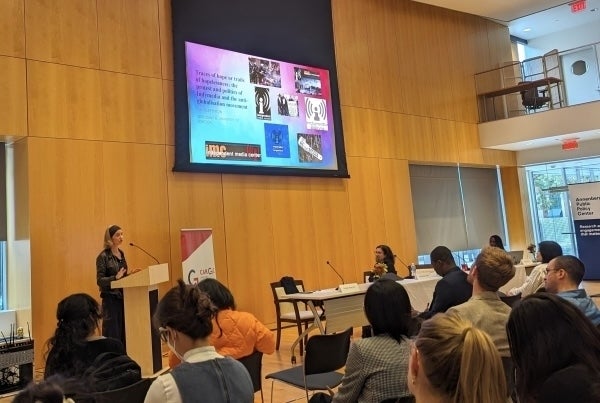
Though Indymedia was established during the tail end of the “long 1990s” its role in the development of digital activism and participatory media is a crucial piece of the early internet history, Fenton said.
She mourns the loss of an internet that was not so deeply in bed with media oligopolies and fostered a sense of hope for activists.
"Some independent media centers still exist,” she said, “but many have closed because of social media, fragmenting protests. It's not connected in the same collectivity. In that process, we lost something.”
Lasting Histories
As a 1990s baby, CARGC Doctoral Fellow Valentina Proust found the symposium especially enlightening.
“The ‘90s were such a huge decade for breakout technology — the massification of the internet and computers — as well as a time dominated by huge conflicts around the world,” she says. “It was a bridge to a new era. It’s interesting to go back to the decade I was born and see it as something historic.”
“Turning Points: The Long 1990s in Internet History” was organized by a committee consisting of CARGC Director Aswin Punathambekar, doctoral student Kinjal Dave, doctoral student Devo Probol, postdoctoral fellow Ignatius Suglo, and former CARGC Senior Research Manager Jing Wang, now an assistant professor at the University of Wisconsin-Madison.



